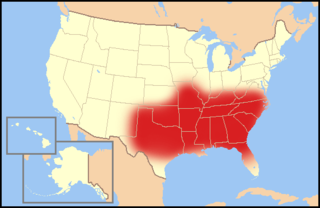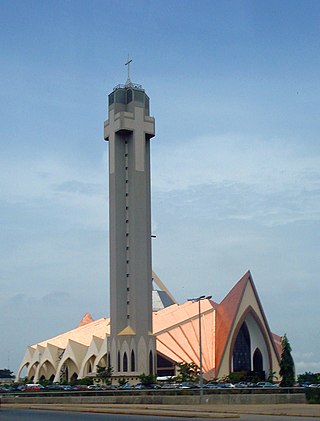
The Christian Exodus Movement, founded by Cory Burnell in 2003, aimed to relocate conservative Christians to South Carolina to form an independent country based on Christian principles. [1] [2] [3] [4]

The Christian Exodus Movement, founded by Cory Burnell in 2003, aimed to relocate conservative Christians to South Carolina to form an independent country based on Christian principles. [1] [2] [3] [4]
It was inspired by movements like the Free State Project. [5] Its goal was to exert local political influence and ultimately establish a theocratic state that could consider secession from the United States. [6] [7] [8] [9] [10] [11]

The Southern Poverty Law Center (SPLC) is an American 501(c)(3) nonprofit legal advocacy organization specializing in civil rights and public interest litigation. Based in Montgomery, Alabama, it is known for its legal cases against white supremacist groups, for its classification of hate groups and other extremist organizations, and for promoting tolerance education programs. The SPLC was founded by Morris Dees, Joseph J. Levin Jr., and Julian Bond in 1971 as a civil rights law firm in Montgomery.

Jones County is in the southeastern portion of the U.S. state of Mississippi. As of the 2020 census, the population was 67,246. Its county seats are Laurel and Ellisville.
Secession is the formal withdrawal of a group from a political entity. The process begins once a group proclaims an act of secession. A secession attempt might be violent or peaceful, but the goal is the creation of a new state or entity independent of the group or territory from which it seceded. Threats of secession can be a strategy for achieving more limited goals.

The term Bible Belt refers to a region of the Southern United States and the Midwestern state of Missouri, where evangelical Protestantism exerts a strong social and cultural influence. The region has been described as one of the most socially conservative across the United States due to a significant impact of Protestant Christianity on politics and culture. The region is known to have a higher church attendance, more evangelical Protestant denominations, and greater emphasis on traditional religious values compared to other parts of the country. The region contrasts with the religiously diverse Midwest and Great Lakes and the Mormon corridor in Utah, southern Idaho, and northern Arizona.
Separatism is the advocacy of cultural, ethnic, tribal, religious, racial, regional, governmental, or gender separation from the larger group. As with secession, separatism conventionally refers to full political separation. Groups simply seeking greater autonomy are usually not considered separatists. Some discourse settings equate separatism with religious segregation, racial segregation, or sex segregation, while other discourse settings take the broader view that separation by choice may serve useful purposes and is not the same as government-enforced segregation. There is some academic debate about this definition, and in particular how it relates to secessionism, as has been discussed online.

Neo-Confederates are groups and individuals who portray the Confederate States of America and its actions during the American Civil War in a positive light. The League of the South, the Sons of Confederate Veterans and other neo-Confederate organizations continue to defend the secession of the former Confederate States.

The League of the South (LS) is an American white nationalist, neo-Confederate, white supremacist organization that says its goal is "a free and independent Southern republic".

Black Hebrew Israelites are a new religious movement claiming that African Americans are descendants of the ancient Israelites. Some sub-groups believe that Native and Latin Americans are descendants of the Israelites as well. Black Hebrew Israelites combine elements to their teaching from a wide range of sources to varying degrees. Black Hebrew Israelites incorporate certain aspects of the religious beliefs and practices of both Christianity and Judaism, though they have created their own interpretation of the Bible, and other influences include Freemasonry and New Thought, for example. Many choose to identify as Hebrew Israelites or Black Hebrews rather than Jews in order to indicate their claimed historic connections.
Donald Livingston is a former Professor of Philosophy at Emory University and a David Hume scholar. In 2003 he founded the Abbeville Institute, which is devoted to the study of Southern culture and political ideas.

Christianity and Islam are the two main religions practiced in Nigeria. The country is home to some of the world's largest Christian and Muslim populations, simultaneously. Reliable recent statistics do not exist; however, Nigeria is divided roughly in half between Muslims, who live mostly in the northern region, and Christians, who live mostly in the southern region of the country. Indigenous religions, such as those native to the Igbo and Yoruba ethnicities, have been declining for decades and being replaced by Christianity or Islam. The Christian share of Nigeria's population is also now on the decline, due to a lower fertility rate relative to the Muslim population in the country.
The Rockford Institute was an American conservative think-tank associated with paleoconservatism, based in Rockford, Illinois. Founded in 1976, it ran the John Randolph Club and published the magazine Chronicles. In 2018 the Rockford Institute merged with the Charlemagne Institute, which became the new publisher of Chronicles. The Charlemagne Institute describes itself as "leading a cultural movement to defend and advance Western Civilization, the foundation of our American republic."

In the context of the United States, secession primarily refers to the voluntary withdrawal of one or more states from the Union that constitutes the United States; but may loosely refer to leaving a state or territory to form a separate territory or new state, or to the severing of an area from a city or county within a state. Advocates for secession are called disunionists by their contemporaries in various historical documents.

Texas secession movements, also known as the Texas Independence movement or Texit, refers to both the secession of Texas during the American Civil War as well as activities of modern organizations supporting such efforts to secede from the United States and become an independent sovereign state.
"Paper terrorism" is a neologism referring to the use of false liens, frivolous lawsuits, bogus letters of credit, and other legal or pseudolegal documents lacking sound factual basis as a method of harassment against an opponent on a scale described as evocative of conventional armed terrorism. These methods are popular among some American anti-government groups and those associated with the redemption movement.

William J. Barber II is an American Protestant minister, social activist, professor in the Practice of Public Theology and Public Policy and founding director of the Center for Public Theology & Public Policy at Yale Divinity School. He is the president and senior lecturer at Repairers of the Breach and co-chair of the Poor People's Campaign: A National Call for a Moral Revival. He also serves as a member of the national board of the National Association for the Advancement of Colored People (NAACP) and is the chair of its legislative political action committee. From 2006 to 2017, Barber served as president of the NAACP's North Carolina state chapter, the largest in the Southern United States and the second-largest in the United States. He pastored Greenleaf Christian Church in Goldsboro, North Carolina, from 1993 to 2023.

The Traditionalist Worker Party (TWP) was a neo-Nazi political party active in the United States between 2013 and 2018, affiliated with the broader "alt-right" movement that became active within the U.S. during the 2010s. It was considered a hate group by the Southern Poverty Law Center's list.